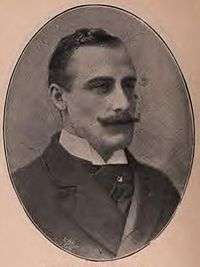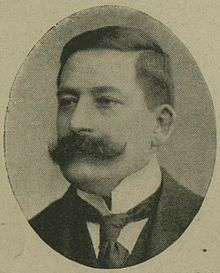Boston (UK Parliament constituency)
| Boston | |
|---|---|
|
Former Borough constituency for the House of Commons | |
| 1547–1918 | |
| Number of members | two (1547-1885); one (1885-1918) |
| Replaced by | Holland with Boston |
| Created from | Lincolnshire |
| 1352–1353s | |
| Number of members | two |
| Replaced by | Lincolnshire |
Boston was a parliamentary borough in Lincolnshire, which elected two Members of Parliament (MPs) to the House of Commons from 1547 until 1885, and then one member from 1885 until 1918, when the constituency was abolished.
History
Boston first elected Members of Parliament in 1352-1353, but after that the right lapsed and was not revived again until the reign of Edward VI. The borough consisted of most of the town of Boston, a port and market town on the River Witham which had overgrown its original boundaries as the river had been cleared of silt and its trade developed. In 1831, the population of the borough was 11,240, contained 2,631 houses.
The right to vote belonged to the Mayor, aldermen, members of the common council and all resident freemen of the borough who paid scot and lot. This gave Boston a relatively substantial electorate for the period, 927 votes being cast in 1826 and 565 in 1831. The freedom was generally obtained either by birth (being the son of an existing freemen) or servitude (completing an apprenticeship in the town), but could also be conferred as an honorary status, and Boston charged a consistently escalating sum to its Parliamentary candidates who wanted to be admitted as freemen - set at £20 in 1700, it was raised to £50 in 1719, to £100 in 1790 and to £135 in 1800.
Major local landowners had some influence over election outcomes through deference of the voters - the Duke of Ancaster, for example, was generally allowed to choose one of the members up to the end of the 18th century - but in the last few years before the Reform Act at least one of the two members seems consistently to have been the free choice of the people of the town. However, bribery was rife in some of the early 19th-century elections, and the election of Thomas Fydell in 1802 was overturned when it was discovered that not only had he been paying electors five guineas for a vote, but that many of these were not qualified to vote anyway. (They were freemen not resident in the borough, whose names had been fraudulently entered as paying the poor rate at houses where they did not live, so as to appear eligible.)
Boston retained both its MPs under the Reform Act, but its boundaries were extended slightly, taking in more of the town and part of the neighbouring parish of Skirbeck. This increased the population of the borough to 12,818, although only 869 of these were eligible to vote in the first election after Reform; this had grown to just over 1,000 by the time of the Second Reform Act, when the widening of the franchise more than doubled it, over 2,500 electors being registered for the 1868 general election which followed. But by the 1870s, electoral corruption had again become a problem in Boston. The result of the 1874 election was overturned for bribery, and a Royal Commission set up to investigate; when the next general election, in 1880, had to be declared void for the same reasons, Boston's representation was suspended for the remainder of the Parliament.
Boston had its right to vote restored for the 1885 election, but the boundary changes which came into effect at the same time slightly reduced the size of the borough and allowed it only one MP. The constituency at this period was mainly middle-class but non-conformists had a strong presence, enabling the Liberals to be competitive where they might otherwise have struggled. The deciding factor which may have tilted the constituency towards the Conservatives in its final years may have been the benefit that the local fisherman saw in Tariff Reform.
The borough was abolished with effect from the general election of 1918, Boston being included in the new Holland with Boston county division.
Members of Parliament
1547-1640
| Year | First member | Second member |
|---|---|---|
| 1547 | John Wendon | William Naunton[1] |
| 1553 (Mar) | Leonard Irby | George Foster [1] |
| 1553 (Oct) | Francis Allen | George Foster [1] |
| 1554 (Apr) | Leonard Irby | George Foster [1] |
| 1554 (Nov) | Leonard Irby | George Foster [1] |
| 1555 | Leonard Irby | George Foster [1] |
| 1558 | Leonard Irby | George Foster [1] |
| 1559 (Jan) | Robert Carr | Leonard Irby [2] |
| 1562/3 | Thomas Heneage, sat for Lincolnshire, replaced Jan 1563 by John Tamworth | Leonard Irby [2] |
| 1571 | Christopher Hatton, sat for Higham Ferrers, replaced 1571 by Thomas Lyfield | Leonard Irby [2] |
| 1572 | Stephen Thymbleby | William Dodington [2] |
| 1584 (Nov) | Nicholas Gorges | Vincent Skinner [2] |
| 1586 (Oct) | Vincent Skinner | Richard Stevenson [2] |
| 1588/9 | Vincent Skinner | Anthony Irby [2] |
| 1593 | Anthony Irby | Richard Stevenson [2] |
| 1597 (Sep) | Anthony Irby | Richard Stevenson [2] |
| 1601 (Oct) | Anthony Irby | Henry Capell [2] |
| 1604 | Anthony Irby | Francis Bullingham |
| 1614 | Anthony Irby | Leonard Bawtree |
| 1621 | Anthony Irby | Sir Thomas Cheek, sat for Harwich replaced by Sir William Airmine |
| 1624 | William Boswell | Sir Clement Cotterell, sat for Grantham replaced by Sir William Airmine |
| 1625 | Sir Edward Barkham | William Boswell |
| 1626 | Sir Edward Barkham | Richard Oakley |
| 1628 | Richard Bellingham | Richard Oakley, unseated after petition replaced by Anthony Irby |
| 1629–1640 | No Parliaments summoned | |
1640-1880
1885-1918
| Election | Member | Party | |
|---|---|---|---|
| 1885 | Representation restored and reduced to one Member | ||
| 1885 | William James Ingram | Liberal | |
| 1886 | Henry John Farmer-Atkinson | Conservative | |
| 1892 | Sir William Ingram | Liberal | |
| 1895 | William Garfit | Conservative | |
| 1906 | George Henry Faber | Liberal | |
| Jan. 1910 | Charles Harvey Dixon | Conservative | |
| 1918 | constituency abolished | ||
Elections
Elections in the 1880s
| Party | Candidate | Votes | % | ± | |
|---|---|---|---|---|---|
| Liberal | William James Ingram | 1,295 | n/a | ||
| Conservative | Nehemiah Learoyd | 996 | n/a | ||
| Majority | 299 | n/a | |||
| Turnout | n/a | ||||
| Liberal win (new seat) | |||||
| Party | Candidate | Votes | % | ± | |
|---|---|---|---|---|---|
| Conservative | Henry John Farmer-Atkinson | 1,192 | |||
| Liberal | William James Ingram | 1,144 | |||
| Majority | 48 | ||||
| Turnout | |||||
| Conservative gain from Liberal | Swing | ||||
Elections in the 1890s

| Party | Candidate | Votes | % | ± | |
|---|---|---|---|---|---|
| Liberal | William James Ingram | 1,355 | 51.2 | ||
| Conservative | Hon. Gilbert Heathcote Drummond Willoughby | 1,293 | 48.8 | ||
| Majority | 62 | 2.4 | |||
| Turnout | |||||
| Liberal gain from Conservative | Swing | ||||

| Party | Candidate | Votes | % | ± | |
|---|---|---|---|---|---|
| Conservative | William Garfit | 1,633 | 56.9 | ||
| Liberal | Sir William James Ingram | 1,237 | 43.1 | ||
| Majority | 396 | 13.8 | |||
| Turnout | 87.0 | ||||
| Conservative gain from Liberal | Swing | ||||
Elections in the 1900s
| Party | Candidate | Votes | % | ± | |
|---|---|---|---|---|---|
| Conservative | William Garfit | 1,710 | 59.7 | ||
| Liberal | William Turner Simonds | 1,155 | 40.3 | ||
| Majority | 555 | 19.4 | |||
| Turnout | 83.1 | ||||
| Conservative hold | Swing | ||||

| Party | Candidate | Votes | % | ± | |
|---|---|---|---|---|---|
| Liberal | George Henry Faber | 1,801 | 51.5 | +11.2 | |
| Conservative | William Garfit | 1,694 | 48.5 | -11.2 | |
| Majority | 107 | 3.0 | 22.4 | ||
| Turnout | 89.7 | +6.6 | |||
| Liberal gain from Conservative | Swing | +11.2 | |||
Elections in the 1910s
| Party | Candidate | Votes | % | ± | |
|---|---|---|---|---|---|
| Conservative | Charles Harvey Dixon | 1,975 | 53.5 | ||
| Liberal | Henry Simpson Lunn | 1,715 | 46.5 | ||
| Majority | 260 | 7.0 | |||
| Turnout | 91.4 | ||||
| Conservative gain from Liberal | Swing | ||||

| Party | Candidate | Votes | % | ± | |
|---|---|---|---|---|---|
| Conservative | Charles Harvey Dixon | 1,875 | 52.3 | -1.2 | |
| Liberal | Hon. Fitzroy Hemphill | 1,712 | 47.7 | +1.2 | |
| Majority | 163 | 4.6 | |||
| Turnout | 88.9 | -2.5 | |||
| Conservative hold | Swing | -1.2 | |||
General Election 1914/15:
Another General Election was required to take place before the end of 1915. The political parties had been making preparations for an election to take place and by the July 1914, the following candidates had been selected;
- Unionist: Charles Harvey Dixon
- Liberal: F. Stapleton Hiley
References
- 1 2 3 4 5 6 7 "History of Parliament". Retrieved 2011-09-30.
- 1 2 3 4 5 6 7 8 9 10 "History of Parliament". Retrieved 2011-09-30.
- ↑ On petition, Parry's election was declared void and Staniland duly elected after scrutiny of the votes
- ↑ At the 1874 election, both Liberal candidates, Ingram and Thomas Parry, were initially declared elected but on petition Parry's election was declared void. After scrutiny 353 of Parry's 1,347 votes were struck off for bribery, and Malcolm, who had originally finished third, was declared elected. Following this election a Royal Commission was appointed to investigate the conduct of elections in Boston
- 1 2 Liberal Year Book 1907
- ↑ Debrett's House of Commons & Judicial Bench, 1886
- 1 2 3 4 5 British parliamentary election results, 1885-1918 (Craig)
- ↑ Debrett's House of Commons 1901
- D Brunton & D H Pennington, Members of the Long Parliament (London: George Allen & Unwin, 1954)
- Cobbett's Parliamentary history of England, from the Norman Conquest in 1066 to the year 1803 (London: Thomas Hansard, 1808)
- F W S Craig, British Parliamentary Election Results 1832-1885 (2nd edition, Aldershot: Parliamentary Research Services, 1989)
- Lewis Namier, The Structure of Politics at the Accession of George III (2nd edition - London: St Martin's Press, 1961)
- J. E. Neale, The Elizabethan House of Commons (London: Jonathan Cape, 1949)
- T. H. B. Oldfield, The Representative History of Great Britain and Ireland (London: Baldwin, Cradock & Joy, 1816)
- Henry Pelling, Social Geography of British Elections, 1885-1910 (London: Macmillan, 1967)
- J Holladay Philbin, Parliamentary Representation 1832 - England and Wales (New Haven: Yale University Press, 1965)
- Edward Porritt and Annie G Porritt, The Unreformed House of Commons (Cambridge University Press, 1903)
- Frederic A Youngs, jr, "Guide to the Local Administrative Units of England, Vol II" (London: Royal Historical Society, 1991)
- Concise Dictionary of National Biography
- Leigh Rayment's Historical List of MPs – Constituencies beginning with "B" (part 4)